Let’s look closer at the Torah [instructions] of God in Leviticus 11:
“These are the animals which you may eat among all the animals that are on the earth:
“Among the animals, whatever divides the hoof, having cloven hooves and chewing the cud—that you may eat.
“Nevertheless these you shall not eat among those that chew the cud or those that have cloven hooves: the camel, because it chews the cud but does not have cloven hooves, is unclean to you; the rock hyrax, because it chews the cud but does not have cloven hooves, is unclean to you; the hare, because it chews the cud but does not have cloven hooves, is unclean to you; and the swine, though it divides the hoof, having cloven hooves, yet does not chew the cud, is unclean to you.
“Their flesh you shall not eat, and their carcasses you shall not touch. They are unclean to you” (Leviticus 11:2-8).[1]
The first group of animals that is considered “food” by YHVH includes animals that have a completely divided split hoof and that chew the cud.
Then the Torah gives us some examples to help us figure this out.
Land Animals
Camels, for instance, chew the cud, but they don’t have a split hoof. It must have a hoof, as opposed to toes or paws, and it must be split in the middle, rather than being in one solid piece. (This is called a “cloven hoof.”)
Compare a camel’s foot to a cow’s feet.
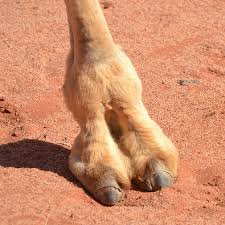
Camel Hoof
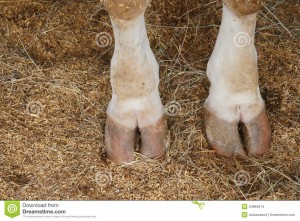
Cow Hooves
The animal must also chew the cud.
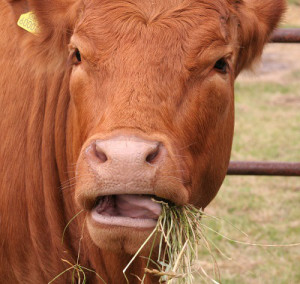
Cow chewing the cud
Since some of us aren’t farmers, we aren’t terribly familiar with what the feet of various animals look like, or if they chew the cud, but a simple Google search can teach us a lot.
- Several clean species of animals include ox and cow, goat, sheep, antelope, deer, bison, elk, giraffe, yak, and water buffalo.
- Some unclean animals include rabbit, badger, dogs, cats, horses, kangaroos, and llamas.
The most famous animal that has split hooves but does not chew the cud is the pig. This is why the pig is considered an unclean animal and is not food for us.
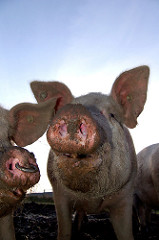
photo credit: I just wanna be your dog via photopin (license)
The Torah says that we are not to eat of an unclean animal’s flesh or touch their carcasses, but it’s fine to snuggle with live animals. It is only their death that makes them unclean to touch or eat.
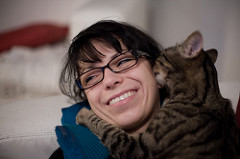
photo credit: nomnom ears! via photopin (license)
Water Creatures
“These you may eat of all that are in the water: whatever in the water has fins and scales, whether in the seas or in the rivers—that you may eat. But all in the seas or in the rivers that do not have fins and scales, all that move in the water or any living thing which is in the water, they are an abomination to you. They shall be an abomination to you; you shall not eat their flesh, but you shall regard their carcasses as an abomination. Whatever in the water does not have fins or scales—that shall be an abomination to you” (Leviticus 11:9-12).[2]
Next, YHVH considers creatures in the water that have fins and scales to be food for us.
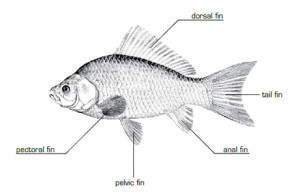
A fish with fins and scales
Several types of seafood that would be considered unclean are lobster, shrimp, clam, catfish, shark, and octopus. Again, we are neither to eat them nor touch their dead carcasses. This would exclude preparing them for someone else to eat.
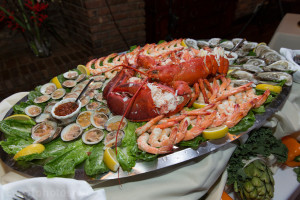
photo credit: New Year’s Eve party via photopin (license)
Flying Creatures
“And these you shall regard as an abomination among the birds; they shall not be eaten, they are an abomination: the eagle, the vulture, the buzzard, the kite, and the falcon after its kind; every raven after its kind, the ostrich, the short-eared owl, the sea gull, and the hawk after its kind; the little owl, the fisher owl, and the screech owl; the white owl, the jackdaw, and the carrion vulture; the stork, the heron after its kind, the hoopoe, and the bat” (Leviticus 19:13-19).[3]
The English text here doesn’t show it, but there is actually uncertainty about what some of these animals were. When the instructions were originally given (in the Hebrew language, of course), the listeners would have been familiar with these animals. However, some of the words are uncertain.
We can note that many of the birds listed are birds of prey or scavengers, but it doesn’t specifically say why YHVH listed just these birds.
Some Jewish rabbis teach that it is wise to only eat “safe” birds, such as chicken, turkey, geese, pheasant, dove, and pigeon, since we aren’t certain exactly what all the other birds listed are.
Insects
“All flying insects that creep on all fours shall be an abomination to you.
“Yet these you may eat of every flying insect that creeps on all fours: those which have jointed legs above their feet with which to leap on the earth. These you may eat: the locust after its kind, the destroying locust after its kind, the cricket after its kind, and the grasshopper after its kind.
“But all other flying insects which have four feet shall be an abomination to you” (Leviticus 11:20-23).[4]
Most Americans aren’t too excited about eating insects, and most all “flying insects that creep on all fours” are unclean.
However, if you’re ever interested, you should know that YHVH considers the following flying insects to be clean: those that have joints above their feet, which are used to leap on the earth.
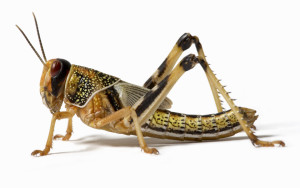
Locust
You probably remember that John the Baptist enjoyed eating locusts dipped in honey!
What to Do about Unclean Animals
So the Torah is clear which animals may be considered food. All others are just animals– not food for us![5]
However, the Torah is also clear that we are not to touch their dead carcasses. What happens if we do?
“By these you shall become unclean; whoever touches the carcass of any of them shall be unclean until evening; whoever carries part of the carcass of any of them shall wash his clothes and be unclean until evening: The carcass of any animal which divides the foot, but is not cloven-hoofed or does not chew the cud, is unclean to you. Everyone who touches it shall be unclean. And whatever goes on its paws, among all kinds of animals that go on all fours, those are unclean to you. Whoever touches any such carcass shall be unclean until evening. Whoever carries any such carcass shall wash his clothes and be unclean until evening. It is unclean to you.
“These also shall be unclean to you among the creeping things that creep on the earth: the mole, the mouse, and the large lizard after its kind; the gecko, the monitor lizard, the sand reptile, the sand lizard, and the chameleon. These are unclean to you among all that creep. Whoever touches them when they are dead shall be unclean until evening. Anything on which any of them falls, when they are dead shall be unclean, whether it is any item of wood or clothing or skin or sack, whatever item it is, in which any work is done, it must be put in water. And it shall be unclean until evening; then it shall be clean. Any earthen vessel into which any of them falls you shall break; and whatever is in it shall be unclean: in such a vessel, any edible food upon which water falls becomes unclean, and any drink that may be drunk from it becomes unclean. And everything on which a part of any such carcass falls shall be unclean; whether it is an oven or cooking stove [traditionally made of clay], it shall be broken down; for they are unclean, and shall be unclean to you. Nevertheless a spring or a cistern, in which there is plenty of water, shall be clean, but whatever touches any such carcass becomes unclean. And if a part of any such carcass falls on any planting seed which is to be sown, it remains clean. But if water is put on the seed, and if a part of any such carcass falls on it, it becomes unclean to you.
“And if any animal which you may eat dies, he who touches its carcass shall be unclean until evening. He who eats of its carcass shall wash his clothes and be unclean until evening. He also who carries its carcass shall wash his clothes and be unclean until evening” (Leviticus 11:24-40).
When reading a long passage like this, it helps to write out a list of all the specific instructions.
- The basic rule is that things stay unclean “until evening,” or until sunset.
- We also see that we need to wash clothes or containers in water, then set them aside until evening.
- If something cannot be washed or if something is water porous (such as a clay pot), we should break it or throw it away.
- If we ourselves are the ones who touched the dead, unclean animal, we need to wash our clothes and be unclean until evening, which generally means that we should try to stay away from others.

Copyright: subbotina / 123RF Stock Photo
It’s likely that these rules are a protection against spreading disease. In fact, note this blessing of keeping the commands in YHVH’s Torah:
“If you diligently heed the voice of the Lord your God and do what is right in His sight, give ear to His commandments and keep all His statutes, I will put none of the diseases on you which I have brought on the Egyptians. For I am the Lord who heals you” (Exodus 15:26).
However, even if we don’t understand God’s commands, or if we can’t find a good reason for them, we need to still be very careful to obey our Creator.
Other Creeping Critters
Leviticus 11 concludes with special instructions for when we touch the carcass of creeping things, like worms or spiders, ants or stink bugs.
“And every creeping thing that creeps on the earth shall be an abomination. It shall not be eaten. Whatever crawls on its belly, whatever goes on all fours, or whatever has many feet among all creeping things that creep on the earth—these you shall not eat, for they are an abomination. You shall not make yourselves abominable with any creeping thing that creeps; nor shall you make yourselves unclean with them, lest you be defiled by them” (Leviticus 11:41-43).
You will note that this time, we are just instructed to not eat them. There is no instruction about what to do if a fly dies on the kitchen counter or if we squash a spider in the bathroom.

All Scripture in this blog post taken from the New King James Version®. Copyright © 1982 by Thomas Nelson. Used by permission. All rights reserved.
[1] Cross reference with Deuteronomy 4:4-9.
[2] Cross reference with Deuteronomy 4:9-10.
[3] Cross reference with Deuteronomy 4:11-18.
[4] Cross reference with Deuteronomy 4:19.
[5] Leviticus 11:2

My first coffee break e-zine. Awesome! Thank you!
Thank you for clarifying and helping me with this chapter.
Thank you for such a succinct explanation this has helped me.